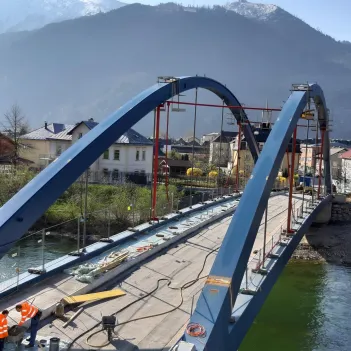Fair Mobility
Fair Mobility and Access to Public Life

- Category
- Project
- Call
- DUT Call 2022
- Duration
- –
- Project coordinator
- University of Applied Sciences Landshut
The Fair Mobility project adresses mobility inequalities in peri-urban and rural areas, where intersecting factors of gender, class, ethnicity, age, and ability shape unequal access. Gaps in public transport in terms of quantity, quality, safety, and comfort disproportionately affect women, gender minorities, and other minoritised groups. Poorly lighting, inaccessible, and unwelcoming public spaces heighten risks of harassment and accidents. Women bear most “mobility of care” trips—fragmented, multi-stop journeys—and face financial constraints that limit options, increasing reliance on inadequate public or active modes. High car dependence fuels emissions, yet peri-urban contexts and under-represented groups remain systemically invisible in policy and research despite their key role in climate goals. Current planning and governance are often gender-blind, with fragmented knowledge transfer between research and practice. Through participatory, gender-sensitive approaches, Fair Mobility investigates how mobility offers, spatial design, and governance can be reshaped to improve accessibility, safety, sustainability, and resilience.
Fair Mobility employs Participatory Action Research across two pilot cities (Ebensee, Austria and Creil, France), with partners in Germany and Romania acting as replicators to co-create and test gender-sensitive mobility solutions.
Through a comprehensive five-phase process, the project combines ethnographic diagnosis (storytelling, commented walks), quantitative surveys, co-design workshops, WALKshops, pop-up interventions, and direct community engagement with minoritized groups including women, LGBTQIA+ individuals, migrants, and caregivers. Concrete interventions include:
Infrastructure improvements (enhanced lighting, upgraded bus stops, cycling routes), policy measures (low-speed zones, anti-harassment campaigns), innovative services (community transport, school travel plans).
Multi-actor networks connecting municipalities, transport operators, civil society, and businesses ensure locally-adapted solutions
while generating scalable outputs: a tested Fair Mobility Catalogue, gender-sensitive design principles, policy recommendations, and a digital practitioner toolbox.
This participatory approach empowers communities to reshape their mobility systems while creating replicable frameworks for addressing intersectional mobility inequalities across Europe's overlooked peri-urban and rural contexts.
Fair Mobility generate meaningful, multi-dimensional impacts by supporting women, gender minorities, and other minoritised groups to co-design inclusive mobility solutions that can improve safety, accessibility, and participation while addressing inequalities. The project seeks to deliver measurable social benefits through: capacity building and improved access to services; policy guidance via gender-sensitive recommendations and local pilot programs; spatial enhancements, such as safer public spaces with better lighting and cycling infrastructure; environmental gains through shifts toward walking, cycling, and shared transport; and economic support for local communities through more accessible mobility services.
Tangible, open-access outputs and practitioner case studies will provide resources for potential replication across Europe. Communication through the project website, social media, films, podcasts, and local workshops engage stakeholders and share emerging insights. Combined with monitoring protocols and stakeholder agreements, these efforts aim to encourage more sustainable governance practices, supporting longer-term, climate-friendly, and equitable mobility systems in diverse peri-urban and rural contexts.
Austria
France
Germany
Romania
Frauenforum Salzkammergut, Genre et Ville, Universite Gustave Eiffel, URBASOFIA SRL, Wonderland – Platform for European Architecture
Marktgemeinde Ebensee am Traunsee, Ville de Creil
Stories on mobility - based on real accounts
Connect to YouTube?
To play this video, a connection to YouTube will be established, and personal data will be transmitted to YouTube.
© Fair Mobility
Contact
David, Kintero Thokora
kij21971@az.haw-landshut.de